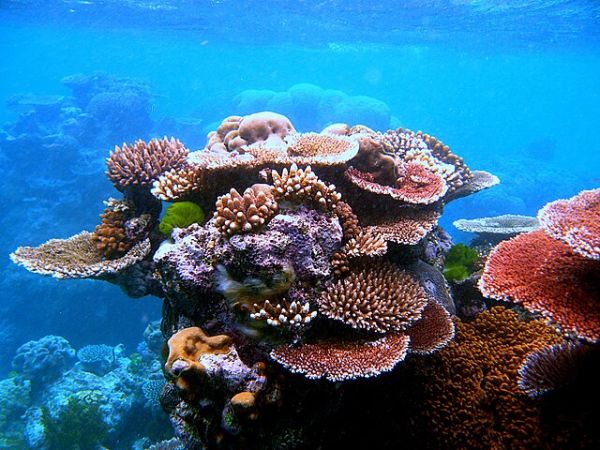From The Conversation comes an article titled More than coral: the unseen casualties of record-breaking heat on the Great Barrier Reef. The article was published 22 April 2024. It was written by four scholars at the University of Sydney in Australia.
I have previously reported on the dire consequences of an overheated planet with respect to coral reefs, with an emphasis on The Great Barrier Reef. This article in The Conversation points out that the ongoing damage is not restricted to coral. Rather, the disaster encompasses entire ecosystems. Whereas bleached coral draws our attention, marine heat does damage to many unseen parts of these ecosystems.
The first paragraph points out the difference between past bleaching events and the current, ongoing bleaching of the Great Barrier Reef: “In past bleaching events on the Great Barrier Reef, the southern region has sometimes been spared worst of the bleaching. Not this time. This year’s intense underwater heat has triggered the most severe heat stress ever seen on record. Only 3% of surveyed southern reefs have not bleached at all. It’s shaping up to be the most severe and widespread bleaching of the southern reef, while mass bleaching has hit other areas of the reef in the fifth mass bleaching event in eight years.”
You heard me correctly. This is the fifth mass bleaching event within the last eight years.
Lest you remain unconcerned about coral reefs and their positive benefit for humans, consider this: (1) whereas coral reefs cover only about 1% of the ocean floor, they provide habitat for about a quarter of all marine species; (2) they include many filter feeders, which consume particulate matter, a type of pollutant that does not dissolve in water; (3) coral reefs protect coastal areas by reducing the power of waves hitting the coast; (4) they provide a source of income for millions of people; (5) they are culturally important, particularly to long-time coastal communities; (6) coral reefs provide unique medicines that provide treatment for many of the world’s most prevalent and dangerous illnesses and diseases; (7) they are a source of food; (8) coral reefs produce about half of the world’s oxygen while absorbing nearly one-third of the carbon dioxide generated from burning fossil fuels; and (9) they provide opportunities for tourism, notably in lesser-developed countries.
If you’re keeping score, there are at least nine good reasons to preserve and protect coral reefs. They are important to the organisms on Earth that breathe, drink water, and eat food. That means you, me, and most other life on Earth. I will briefly address each of the nine benefits provided by coral reefs.
First up, habitat for species in the ocean. Life on Earth first occurred in the ocean. Many species on Earth still depend upon coral reefs for habitat. The ratio of oceanic species to ocean floor is about 25 to 1. That’s a remarkable ratio that I doubt is found in many other locations. Again, about a quarter of the species in the ocean depend upon coral reefs, which collectively account for only about 1% of the ocean floor.
If you’re not impressed by life-preserving habitat for species on which we depend for our continued existence, perhaps you’ll find removal of pollutants important. The filter feeders found predominately among coral reefs consume abundant particulate matter. In removing this particulate matter, coral reefs remove nasty pollutants. They do this at no charge to a society obsessed with money.
Coral reefs protect coastal areas by reducing the power of waves hitting the coast. You’re probably concerned about this issue only if you live on the coast. Bear in mind that, at least in the country of my birth, costly disasters come at the expense of those of us who pay taxes. Our taxes are used to fund the cleaning up of messes. They are also used to pay for military actions. I can imagine you not being interested in either of these, although I would guess that—like me—you will gladly pay for the messes to which you contribute. These include inattention to the protection of coral reefs and a lot of other ecosystems.
Item four is a source of income for millions of people. I know you didn’t create disaster capitalism. If you’re like me, you’re no fan of disaster capitalism. We’re stuck with it, and—like it or not—we have to make a living.
Item five is cultural importance, especially to long-time coastal communities. Some of these coastal communities have depended upon coral reefs for essentially every aspect of their existence. Coral reefs serve as the centers of spirituality, beyond providing food. For indigenous people, a life without coral reefs is no life at all.
Item six is providing medicines that enable treatment for many of the world’s most prevalent and dangerous illnesses and diseases. Many organisms found on coral reefs produce chemical compounds that are used for the treatment of cardiovascular diseases, leukemia, lymphoma, and skin cancer. More than half of all new drugs for treating cancer are found within marine organisms that depend upon coral reefs.
From a pragmatic perspective, coral reefs are a significant source of food. They supply 15 tons of seafood per square kilometer of coral reef. As a result, reefs supply protein for 4.3 billion people in the world.
Item number eight is the production of oxygen, which is very convenient for those of us who breathe. Coral reefs produce about half of the world’s oxygen. They also absorb nearly one-third of the carbon dioxide generated from burning fossil fuels.
Finally, coral reefs provide opportunities for tourism, notably in lesser-developed countries. Again, many of the people in these communities would rather not engage in tourism. However, given the nature of the capitalism-driven world, tourists spending money in these lesser-developed countries represent a lifesaver for impoverished people.
Here’s the bottom line: Coral reefs save lives. They allow the continued existence of many species, including Homo sapiens, on this planet. As a result, I’m a fan.
Author
"Dr. Guy McPherson is an internationally recognized speaker, award-winning scientist, and the world’s leading authority on abrupt climate change leading to near-term human extinction. He is professor emeritus at the University of Arizona, where he taught and conducted research for twenty years. His published works include 14 books and hundreds of scholarly articles. Dr. McPherson has been featured on TV and radio and in several documentary films. He is a blogger, cultural critic, and co-host of his own radio show “Nature Bats Last.” Dr. McPherson speaks to general audiences across the globe, and to scientists, students, educators, and not-for-profit and business leaders who seek their best available options when confronting Earth’s cataclysmic changes." source








